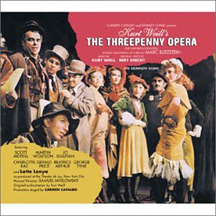The Threepenny Opera (Die Dreigroschenoper) is a “play with music”, translated by German dramatist Elisabeth Hauptmann from John Gay’s 18th-century English ballad opera, The Beggar’s Opera, with music by Kurt Weill, and insertion ballads by François Villon and Rudyard Kipling as adapted by Bertolt Brecht. The work offers a Socialist critique of the capitalist world. It opened on 31 August 1928 at Berlin’s Theater am Schiffbauerdamm. By 1933, when Weill and Brecht were forced to leave Germany by Hitler’s Machtergreifung, the play had been translated into 18 languages and performed more than 10,000 times on European stages. Songs from The Threepenny Opera have been widely covered and become standards, most notably “Die Moritat von Mackie Messer” (“The Ballad of Mack the Knife”) and “Seeräuberjenny” (“Pirate Jenny”). (More from Wikipedia)
On the following album, The Times They Are A-Changin’, the targets are even more diffuse. The structure of “When the Ship Comes In” was inspired – by way of the cultural tastes of Dylan’s former girlfriend Suze Rotolo – by a Bertolt Brecht/Kurt Weill song “Pirate Jenny”; the song comes from their play, The Threepenny Opera. The song is closely associated with Weill’s wife, the Austrian singer Lotte Lenya, and her breakout role was in a 1928 production of The Threepenny Opera. The most famous song from that play is “Mack the Knife”, which was an unexpectedly huge hit for Bobby Darin in 1959. The lyrics in his version of the song even reference “Miss Lotte Lenya”. Lenya is best known to Americans for her role as the villainous Rosa Klebb in the 1963 James Bond movie, From Russia with Love.
(May 2013)















